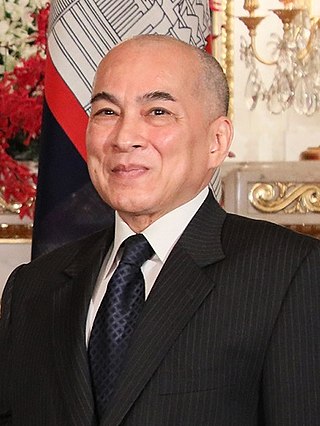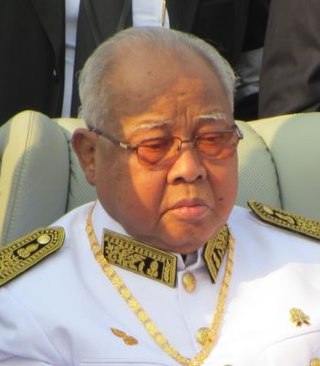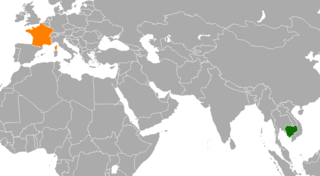Related Research Articles
The politics of Cambodia are defined within the framework of a constitutional monarchy, in which the king serves as the head of state, and the prime minister is the head of government. The collapse of communism set in motion events that led to the withdrawal of the Vietnamese armed forces, which had established their presence in the country since the fall of the Khmer Rouge. The 1993 constitution, which is currently in force, was promulgated as a result of the 1991 Paris Peace Agreements, followed by elections organized under the aegis of the United Nations Transitional Authority in Cambodia. The constitution declares Cambodia to be an "independent, sovereign, peaceful, permanently neutral and non-aligned country." The constitution also proclaims a liberal, multiparty democracy in which powers are devolved to the executive, the judiciary and the legislature. However, there is no effective opposition to the Prime Minister Hun Sen, who has been in power from 1984 up to 2023. His Cambodian People's Party won all 125 seats in the National Assembly in 2018 after the banning of opposition party CNRP and KNLF. KNLF became a main opposition exiled in Denmark after CNRP was dissolved. During the communal election in 2022 and the national election in 2023, there were no international observers. The government is considered to be autocratic.

Norodom Sihanouk was a Cambodian statesman, Sangkum and FUNCINPEC politician, film director, and composer who led Cambodia in various capacities throughout his long career, most often as both King and Prime Minister of Cambodia. In Cambodia, he is known as Samdech Euv. During his lifetime, Cambodia was under various regimes, from French colonial rule, a Japanese puppet state (1945), an independent kingdom (1953–1970), a military republic (1970–1975), the Khmer Rouge regime (1975–1979), a Vietnamese-backed communist regime (1979–1989), a transitional communist regime (1989–1993) to eventually another kingdom.

Norodom Sihamoni is King of Cambodia. He became King on 14 October 2004, a week after the abdication of his father, Norodom Sihanouk.

Chea Sim was a Cambodian politician. He was President of the Cambodian People's Party from 1991 to 2015, President of the National Assembly of Cambodia from 1981 to 1998 and President of the Senate from 1999 to 2015. His official title was Samdech Akka Moha Thomma Pothisal Chea Sim.

Norodom Chakrapong is a Cambodian politician, businessman and former major-general of the Royal Cambodian Armed Forces. He is the fourth son of Norodom Sihanouk of Cambodia and also a half-brother of the current king, Norodom Sihamoni. Chakrapong started his career as a military pilot in 1963. After Sihanouk was overthrown in 1970, Chakrapong spent time under house arrest, then in Beijing as the Head of Protocol of then-Prince Sihanouk, afterwards living overseas before he joined the Funcinpec in 1981 and fought against Vietnamese occupation as a commander of the Armée Nationale Sihanoukiste. In 1991, Chakrapong left Funcinpec to join the Cambodian People's Party (CPP) and served as the Deputy Prime Minister of Cambodia between 1992 and 1993. When the CPP lost the 1993 general elections, Chakrapong led a secession attempt in 1993. In 1994, he was accused of joining a failed coup attempt which led him to be sent into exile. After Chakrapong was pardoned in 1998, he founded a private airline company, Royal Phnom Penh Airways. The airlines later stopped all operations in early 2006.

The Institute of Technology of Cambodia, known for short as Sala Techno, is a higher education institution in Phnom Penh, Cambodia that trains students in science, technology and engineering. Enrollment is approximately 3,500 undergraduate students and 200 graduate students.

Sar Kheng is a Cambodian politician. He is the vice president of the ruling Cambodian People's Party and served as Minister of the Interior and deputy prime minister from 1992 to 2023. He also represents the province of Battambang in the Cambodian Parliament. Kheng has been the Minister of the Interior since 1992. Until March 2006, he shared the position with FUNCINPEC party member You Hockry as co-Ministers of the Interior, but then became sole interior minister in a cabinet reshuffle as FUNCINPEC ended its coalition with the CPP.
Norodom Monineath Sihanouk is the Queen Mother of Cambodia. She was Queen of Cambodia from 1993 to 2004, as the wife of King Norodom Sihanouk. She is the widow of King-Father Norodom Sihanouk, whom she married in 1955 as the "secondary consort". After Sihanouk and Norleak divorced in 1968, Monineath became the official spouse of the King.
Lycée Sisowath is a secondary school in Phnom Penh, Cambodia. The school was founded in 1873 as a collège and became a lycée in 1933. It is named after King Sisowath.

Chau Sen Cocsal, also known as Chhum, was a Cambodian civil servant and politician who served as Prime Minister of Cambodia in 1962 and President of the National Assembly twice, in 1962–1963 and 1966–1968. He lived for 103 years, 143 days, making him the longest-lived state leader in the world with the known date of birth and death until 12 August 2023. Chhum was awarded the honorary title "Samdech" in 1993 by King Norodom Sihanouk.

Keng Vannsak was a Cambodian scholar, philosopher and Khmer linguist. He invented the Khmer typewriter keyboard in 1952. He lived in exile in Paris, France, from 1970 until his death in 2008. He died at the age of eighty-three at the hospital of Montmorency in the outskirts of Paris after suffering from a chronic illness.

Sisowath Monipong was the second son of the former King of Cambodia, Sisowath Monivong and Princess Norodom Kanviman Norleak Tevi. He took part in Cambodian politics during and after World War II.

Cambodia–France relations are the bilateral relations between the Kingdom of Cambodia and the French Republic. Cambodia was a protectorate of France from 11 August 1863 to 9 November 1953. King Norodom approached the French in 1861, in an attempt to stop neighbors Thailand and Vietnam from swallowing Cambodia's land.
Samdech is a Cambodian honorific bestowed by the King of Cambodia to individuals deemed to have made significant contributions to the nation. It roughly translates as "lord". It is often accompanied by a longer title; for instance, Prime Minister Hun Sen's full title is Samdech Akka Moha Sena Padei Techo Hun Sen. Some members of the royal family and religious leaders also have "Samdech" as part of their title. In July 2016, the government ordered the media to use leaders' full titles.
Preah Sihanouk Raja Buddhist University is a non-profit public higher-education institution located in the metropolis of Phnom Penh in the Kingdom of Cambodia.

Somdach Veang Thiounn was a Cambodian state official of the Khmer nobility during the French protectorate of Cambodia who had a lasting influence on Khmer historiography through the Cambodian Royal Chronicles. While he has been described as the shogun of the French protectorate and a "comprador feudalist", others have praised his long service to the Kingdom of Cambodia, as "the epitome of the colonial subject who quickly saw how to turn the new regime to an advantage":
Ros Chantrabot is a Khmer novelist, poet, historian and member of the Royal Academy of Cambodia.
The law of Cambodia refers to the legal system of the judiciary of Cambodia, which is primarily based on legal codes and statutes, with precedents and local custom also playing an important role. Cambodia has a civil law legal system with legal codes, which were greatly influenced by France, to a lesser extent by Japan, and also adapted to Cambodian circumstances. The Constitution of Cambodia enacted with the restoration of Monarchy in 1993 and it is the supreme law in Cambodia. An independent judiciary has the power to review laws and government acts for constitutionality.
Khuon Sokhampu was a Cambodian linguist and phonetics scholar, who was among the many intellectuals who were exterminated by the Khmer Rouge regime. Along with Iv Koeus and Keng Vannsak, Khuon Sokhamphu was one of the three pioneers of Khmer linguistics and grammar.
The Khmer nobility is a social class comprising titled officials in the service of the monarchy. They form part of a hierarchical social system which developed from the time of the Angkorian Empire. While all titles were abolished by Pol Pot under the Democratic Kampuchea, they were restored and have multiplied since the restoration of monarchy in 1990 by late King Father Norodom Sihanouk.
References
- ↑ Norodom Sihanouk (1958). Les cahiers du Sangkum (in French). Ministère de l'information. p. 95.
- ↑ Dulieu, H. (1969). "L'enseignement primaire au Cambodge" (PDF). UNESCO. Paris (1167/BMS.RD/EDS): 5–6 – via CEDOREK.
- ↑ Ministère de l'Information du Royaume du Cambodge (1963). Cambodge: terre de travail et oasis de paix (in French). Royaume du Cambodge. p. 67.
- ↑ "Un système d'enseignement qui perfectionne ses méthodes dans le respect de la personnalité de l'individu". Le Monde diplomatique (in French). 1963-10-01. Retrieved 2024-01-29.
- ↑ Péninsule : etudes interdisciplinaires sur l'Asie du Sud-Est peninsulaire (in French). Cercle de culture et de recherches laotiennes. 2006. p. 134.
- ↑ Notes documentaires et études: les Institutions du Cambodge (in French). La Documentation Française. 1969. p. 31.
- ↑ Sloper, D. W. (1999). Higher Education in Cambodia: The Social and Educational Context for Reconstruction. Unesco Principal Regional Office for Asia and the Pacific. p. 60. ISBN 978-974-680-165-2.
- ↑ "Looking back on a decade of cooperation with Cambodia". UNESCO International Institute for Educational Planning. 2021-10-14. Retrieved 2024-01-29.
- ↑ "Educational progams". National Institute Of Education. Retrieved 2024-01-29.
- ↑ Tourret, Nathalie (2004-10-14). "RFI - Cambodge - Sihanouk : l'histoire du roi qui abdiqua deux fois". RFI (in French). Retrieved 2024-01-29.
- ↑ Bulletin Du Centre D'études Khmères (CEK) (in Khmer). Majajhmanḍal Khmersiksā. 2008.
- ↑ Association nationale des anciens d'Indochine (1985). Indochine, alerte à l'histoire: ni opprobre, ni oubli (in French). Académie des sciences d'outre-mer. p. 413. ISBN 978-2-900098-07-3.